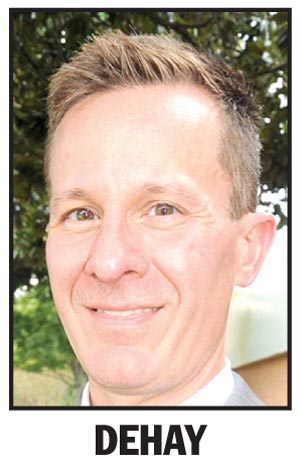Tech president talks return to school

By Greg Oliver
Courtesy The Journal
goliver@upstatetoday.com
PENDLETON — On Monday, Tri-County Technical College president Galen DeHay unveiled to Tech commissioners the academic instruction plans for the fall semester, which is set to begin Aug. 17 
 with both face-to-face instruction and online classes — and many courses using a mix of the two.
with both face-to-face instruction and online classes — and many courses using a mix of the two.
Because most courses will have a combination of online and on-campus instruction, DeHay said Tech plans to deploy mobile hotspots to students without or unable to afford home internet service. The device and monthly service fee will be covered by the college.
“Whether courses meet online or in person, we are committed to providing an educational experience that is engaging, interactive and offers timely and meaningful feedback,” DeHay said. “Students will have opportunities to interact and engage with not only the course content, but with other students and instructors as well.”
For example, DeHay said welding and arts and science students will have a mix of basic lecture material and face-to-face instruction at the school’s Sandy Springs site. Arts and science are among the courses to be delivered in a hybrid format, with students coming to campus once a week, though not simultaneously, to reduce the amount of density on campus.
When the college, like all educational institutions, was forced to go from classroom to virtual instruction last spring due to the COVID-19 pandemic, DeHay said Tech adjusted and converted more than 1,000 courses to e-Learning.
Keeping in mind that not all students learn the same way, DeHay said Tech officials have been working to provide both options to students during the fall term, while also taking all the necessary safety precautions due to COVID-19.
“Every person on the Tri-County Technical College campus or learning center — whether student, employee, contract worker or visitor — will be required to wear a face covering,” he said.
In addition, DeHay said a distance of 6 feet must be maintained from others at all times. He also said proper hand hygiene and respiratory etiquette must be practiced, such as covering a cough or sneeze, and that students and employees should stay home if feeling sick or having COVID-19 symptoms.
Students will be required to watch a return-to-campus video and review a COVID-19 health and safety screening document weekly. Employees will be required to complete online trainings and a weekly health screening survey.
Faculty members who teach on-campus classes, support staff, employees supporting enrollment efforts and other employees as identified by their supervisor are deemed essential and can report to campus in August. Work schedules will remain flexible and may include a mix of on-campus and remote work. Some employees will continue working remotely until there is a drop of COVID-19 cases in the region. Health and safety protocols for facilities include sanitizing, cleaning and disinfecting, space determinations and alterations to ensure physical distance, protective barriers installed in front-line service areas, signs placed throughout campuses, traffic and queuing lanes established, fresh air exchange increased and higher efficiency filters deployed.
“Every time we say required, I promise you we have accountability measures,” DeHay said.
He added that welding labs will only hold 12 students but are already built for physical distancing since they are enclosed on each side along with a welding curtain.
When asked how long he thought the protocols would remain in place, DeHay said he is following DHEC and CDC guidelines and expects to do so until a COVID-19 vaccine is in place.
“When you see a vaccine and control of community spread, you will see a relaxation of the requirements you see here,” he said. “When (former Tech president Dr. Ronnie) Booth retired, he didn’t pass along this crystal ball to me.”
DeHay said the college has installed more than 100 hand sanitizing stations on the Pendleton campus alone, as well as disinfecting wipes. Bathroom renovations, which were already taking place in some of the college’s larger buildings at the time of COVID-19, also feature no-touch faucets and no-touch hand towel machines. The college has also increased its budget for janitorial services.
DeHay added that he and human resources officials are concerned about the long-term mental effect of working in a COVID-19 environment and are working on ways to address it.
“Our employees are very important to us,” he said.


























